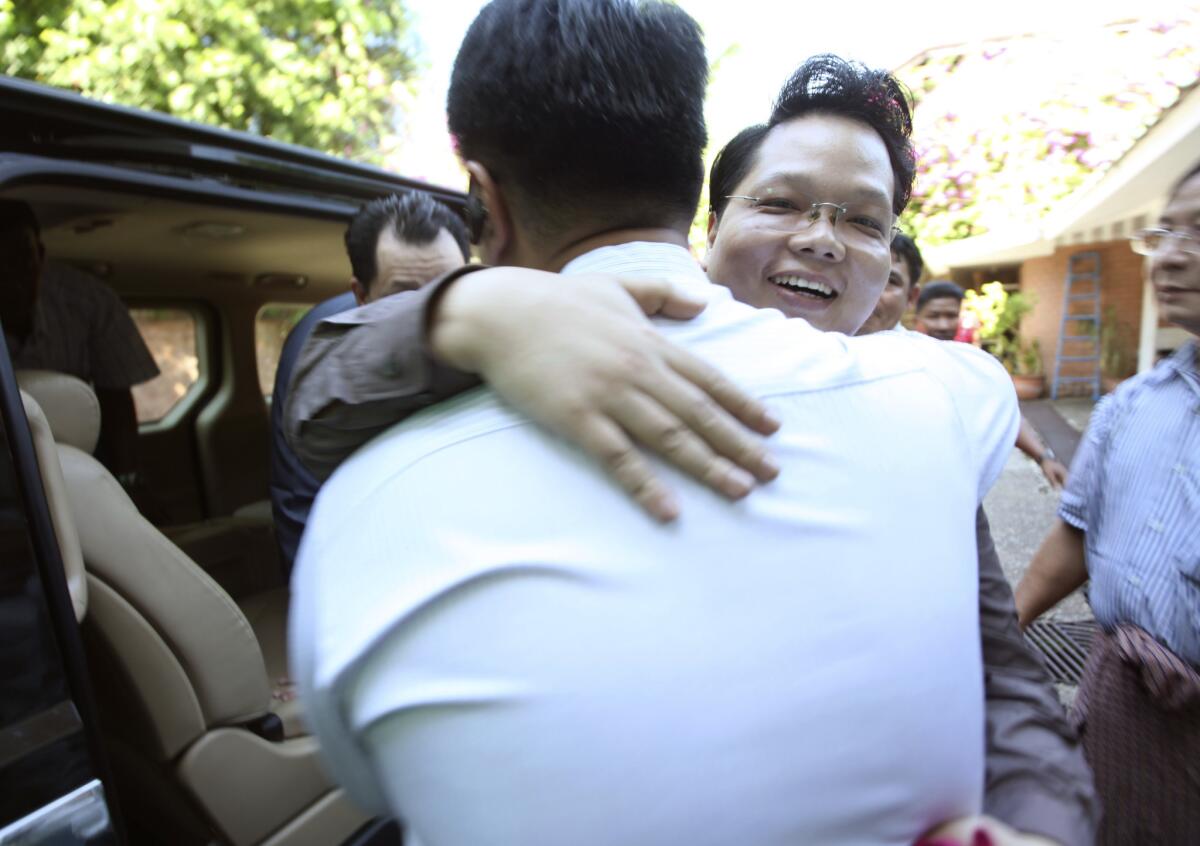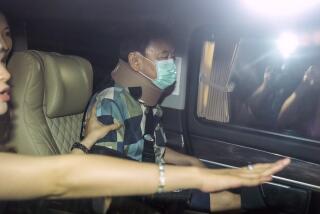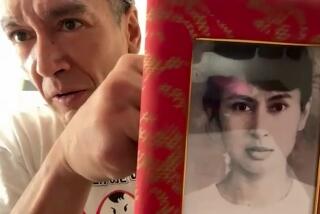Myanmar releases 69 prisoners in act of ‘benevolence’

NEW DELHI -- Rushing to meet a self-imposed year-end deadline to release all political prisoners, Myanmar on Friday announced the release of 69 inmates from over a dozen jails nationwide, explaining in a statement that the move demonstrated the “benevolence and loving kindness of the state.”
The U.S. and other Western nations have long urged Myanmar, also known as Burma, to release all prisoners of conscience in return for international recognition, increased foreign investment, an end to economic sanctions and more financial aid as the country moves from pariah state to nominal democracy.
The announcement came as the country hosted several high-profile foreign visitors, in keeping with a practice of timing prisoner releases to coincide with international events.
President Thein Sein met with European Union foreign policy chief Catherine Ashton on Thursday on a European mission to the country. Separately, he met with former President Clinton, who is in Myanmar for his foundation, while former British Prime Minister Tony Blair is also in the country.
“This is routine practice of the president to release prisoners [around the time of a] a big international event,” said Tint Swe, chairman of the Burma Center Delhi. “If the government genuinely had good intentions and their mind was made up to release political prisoners, just release them anytime.”
Since Thein Sein, a former army general, came to power in March 2011, his government has released over 2,000 political prisoners, eased media restrictions and allowed opposition leader Aung Sang Suu Kyi and members of her previously banned party to run for office. But the country’s controversial 2008 constitution still leaves fundamental power in the military’s hands with provisions that include a guaranteed 25% of seats reserved for it in parliament.
In a statement, Thein Sein’s office said Friday the amnesty was designed to “respect humanitarian grounds” and allow those freed to “assist in national building.”
The president pledged in July while on a visit to London to free all political prisoners by the end of the year. But human rights groups say the government has a selective definition of what constitutes a political prisoner and political freedom.
Many farmers and activists jailed recently for protesting land seizures and industrial pollution, for example, remain behind bars. And several onerous laws, including Section 18 of the Peaceful Assembly Law, can still be used at the discretion of authorities to prevent demonstrations.
“We want the unconditional release of all prisoners at the earliest,” said Bo Kyi, joint secretary of the Thailand-based Assistance Assn. for Political Prisoners in Myanmar, a watchdog group. “It is difficult to say that there will not be any more arrests.”
For decades, the former military regime arrested people arbitrarily even as it denied it held political prisoners, terming them common criminals.
When military rule ended in 2011, an estimated 2,200 political prisoners remained behind bars, including journalists, politicians, political activists, comedians and artists, facing sentences as long as 60 years for “crimes” as questionable as criticizing the government. Many in the nation’s 42 prisons and 109 labor camps had endured torture, hard labor and insufficient food.
Since then, the government has released over 29,820 prisoners of all types. About 60 political prisoners remain in various Burmese detention centers, according to the prisoner assistance group, while another 255 are facing charges for political activities.
Analysts said Myanmar’s government is keen to use the prisoner release program to show its political reforms are genuine and not window dressing, as some critics charge.
“The releases are a clever move by the government because they want sanctions to be eased,” said Manmohini Kaul, a professor at New Delhi’s Jawaharlal Nehru University. “They don’t want to completely rely on China. They want more [Western] investments.”
The government set up a committee in May whose members include former detainees to identify political prisoners and recommend their release. But the task hasn’t been easy, some members said, because some detainees have also committed crimes.
This is the 13th prisoner release since Thein Sein came to power. In October, Myanmar freed 56 political prisoners and in July another 70, including many associated with armed ethnic minority groups in northern Kachin state and eastern Shan state. The government is trying to forge a nationwide peace deal with ethnic rebels.
Prominent activist Naw Ohn Hla, who received a two-year sentence in August for causing “public panic,” was among those released Friday after being detained for attempting to demonstrate against a controversial copper mine partly owned by the Chinese military.
“The regime really needs to take some image-saving measures apart from the time-to-time release of political prisoners, to prove that they are serious and looking for proper reforms,” said Tint Swe.
ALSO:
Philippines government defends typhoon response
China to loosen its one-child policy, end labor camps
Remittances to Latin America rebound -- except in Mexico
Twitter: @markmagnier
Tanvi Sharma in the Times’ New Delhi bureau contributed to this report.
More to Read
Sign up for Essential California
The most important California stories and recommendations in your inbox every morning.
You may occasionally receive promotional content from the Los Angeles Times.










